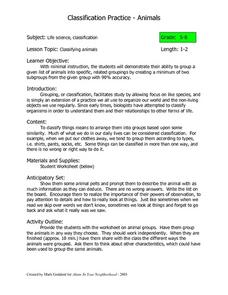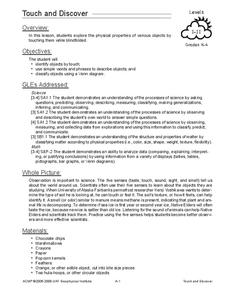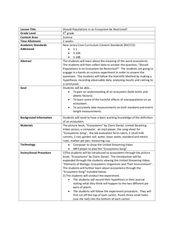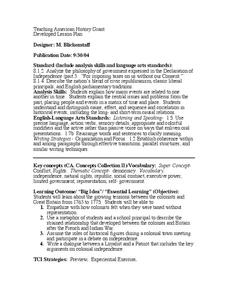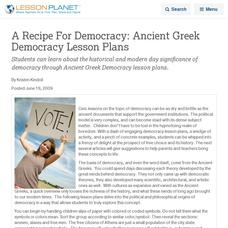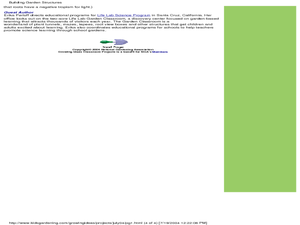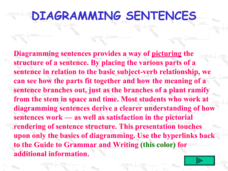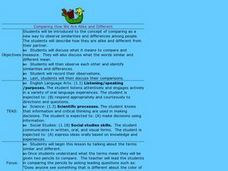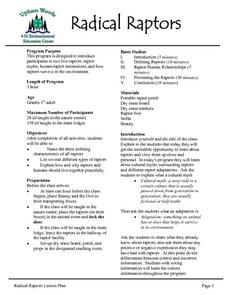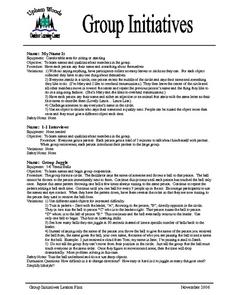Curated OER
Polymer Basics
In this polymer worksheet, students use an on line site to complete sentences about plastics, their chemical make-up, their uses, their history and information about recycling plastics.
Curated OER
Classification Practice-Animals
Students use pictures of animals to make a classification system. In this classification lesson plan, students are given pictures of different animals. They create a classification system for the animals and identify what they have in...
Curated OER
The New Texas Two-Step
Sixth graders work with mathematical expressions by interpreting, analyzing and problem solving with them. In this two step algebraic problem solving lesson, 6th graders use algebra tiles to solve equations.
Curated OER
Papier-Mache Retirement Buddies
Students make papier-mache people. In this relationship building lesson, students develop a relationship with a local retirement center or nursing home and get to know at least one of the residents. Students make a papier-mache...
Curated OER
Touch and Discover
Students identify the physical properties of items using the sense of touch. In this touch and discover lesson, students describe items. Students sort items using a Venn diagram.
Curated OER
Dream Houses
Students imagine and create their dream house. For this comprehension and interpretation lesson, students read The Big Orange Splot, answer comprehension questions about the story and complete a character traits web. Students describe...
Curated OER
Should Populations in an Ecosystem be Restricted?
Fourth graders experiment to determine how overpopulation effects ecosystems specifically plants. In this ecosystem lesson, 4th graders conduct an ecosystems experiment after listening to Claire Daniel's, Ecosystems. They watch a video,...
Curated OER
Exploring for Petroleum - Modeling an Oil Reserve
Students experiment with locating oil reserves. In this conservation lesson, students use a cardboard box to create sand, rocks, and an oil reserve (water balloon). They use a probe to dig around in the box to find the oil reserve and...
Curated OER
Modeling an Oil Reserve
Young scholars conduct an experiment. In this oil and natural gas instructional activity, students learn how geoscientists identify and explore reserves of petroleum. Young scholars make a model of an oil reserve, record how much it...
Curated OER
The Declaration of Independence
Students empathize with the colonists. In this lesson on the Declaration of Independence, students collaborate to problem solve a school dilemma that enables them to understand the issues and difficulties that occurred in the creation of...
Curated OER
Reptiles and Amphibians
Fourth graders explore biology by viewing animal videos in class. In this amphibian and reptile lesson plan, 4th graders identify the key differences between reptiles, amphibians and other animal classifications. Students view video...
Curated OER
A Recipe For Democracy: Ancient Greek Democracy Lesson Plans
Students can learn about the historical and modern day significance of democracy through Ancient Greek Democracy lesson plans.
Curated OER
Meet the Eastern Flock: Hatch Year 2002
Students read nonfiction books and magazine articles about whooping cranes.
Curated OER
Poetic Devices
In this figurative language worksheet, students read and study examples of simile and metaphor. There are 20 questions to be used with Smartboard and 10 questions in which students identify similes or metaphors.
Curated OER
Classification
Students investigate how different types of food can be classified then counted. In this sorting, arranging, and classifying lesson plan, students explore how to group foods based on commonalities. Students are asked four questions which...
Curated OER
Walk on the Wild Side
Have your class practice alliteration using this activity. Learners listen to stories with alliterative elements and create their own sentences illustrating this technique. The activity is incomplete, but could be enhanced to provide a...
Curated OER
Beneath the News: Who's Doing What to Whom, and Who Cares?
Students investigate the differences between various forms of media (print, radio, TV, Internet). They determine the target audience for each and compare exposure around the world. They write a short story and share it with the class.
Curated OER
African Art and Personal Adornment
Students explore the concept of personal adornment. They view and compile a list examples and compare personal adornment in American culture to that in African culture.
Curated OER
Sprouting Sprouts!
Learners plant sprout seeds and make observations. In this lesson about planting, students make observations, predictions, and record information. Learners analyze how the sprout plants grow and determine if any of the four sprout seeds...
Curated OER
Growing Up (And Around, and Down...) Exploring Plant Growth
Students build plant growing structures. In this plant growth lesson, students plant growth structures such as a garden tepee or a crawl through tunnel. They grow plants that are appropriate for the structure.
Tech Coach Corner
Diagramming Sentences
Show this presentation to demonstrate how to diagram sentences. Meant for more advanced grammarians who know the difference between indirect and direct objects, this PowerPoint adds on new elements to each slide. The graphics and sound...
Curated OER
Comparing How We Are Alike and Different
Students introduced to comparing as a way to observe differences among people.
Curated OER
Radical Raptors
Students are introduced to raptors and their role in the environment. They identify three characteristics of raptors and list several types of raptors found in nature. They discuss their positive and negative experiences with raptors and...
Curated OER
Group Initiatives
Students explore the names and qualities about members in the group. They each say their name and something about themselves. Students gather around in a circle. They listen to the teacher as he or she says the name of someone and throws...



